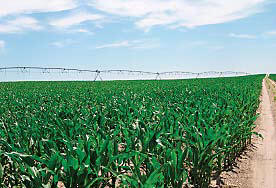Tucked into the far northeastern corner of
Colorado is the small town of Holyoke. The surrounding lands
have always been productive, and water pumped from the Ogallala
Aquifer has helped irrigate the fields. It is in this area where the
Sprague family has been farming for more than 60 years. The farm has
been productive in good years and has weathered the bad years, and
the current generation of Sprague family is determined to make sure
the family farm continues to do a healthy business.
To ensure the farm’s operation stays in good health, the Sprague
family added a new step to its winter-time chores. Along with
getting some much needed rest, repairing buildings and vehicles, and
attending to anything else which came up, the Sprague family got
together and formed a plan. They laid out their goals of what they
wanted to achieve in the upcoming season with the farm. They
determined how much money they wanted to make and how much they
could expect to make. After mapping out expenses, the potential for
income, and estimating several other factors from weather to the
availability of water, the Sprague family found themselves in a
confident position when it came to start the work of the growing
season.
To understand the plan the Sprague family put together, you must
first know a little about the Spragues. Four brothers formed the
Sprague Brothers Cooperative Farm in the 1940s, and over the years,
it has evolved into EWS Farms. Russell and Kimberlee Sprague took
over the farm after they finished high school. Russell managed the
farm’s operations and Kimberlee managed the books. The couple had
five children. Knowing the benefits of education, they urged their
children to peruse college educations.
Two of the children, along with their spouses, have returned to
Holyoke and the EWS Farm after graduating to join Russell and
Kimberlee in working on the farm. The newer generation of the
Sprague
 family is also involved in off-farm jobs and activities. The eldest
son, Aaron, coaches football (along with Russell) for the local
school district and Aaron’s wife Amber teaches Spanish. Eldest
daughter Desiree is also a teacher and her husband Aaron Mosenteen
also helps out in running the local football program. The lessons
learned at college were not forgotten, and the eldest son Aaron was
able to convince his family that they all had an interest in
ensuring the long-term viability of the farm. Aaron is also a
co-developer of the SRMP and has applied the system to his own farm
to improve and validate the program.
family is also involved in off-farm jobs and activities. The eldest
son, Aaron, coaches football (along with Russell) for the local
school district and Aaron’s wife Amber teaches Spanish. Eldest
daughter Desiree is also a teacher and her husband Aaron Mosenteen
also helps out in running the local football program. The lessons
learned at college were not forgotten, and the eldest son Aaron was
able to convince his family that they all had an interest in
ensuring the long-term viability of the farm. Aaron is also a
co-developer of the SRMP and has applied the system to his own farm
to improve and validate the program.
“What it’s done is given us a plan to stick to,” Aaron Sprague
said. “We have already figured out what we want to be doing, so
there is no guessing about what needs to be done, when we should
sell and what we should do if a problem should come up.”
In many ways, EWS Farm is a typical family-owned operation. It
boasts 2,500 acres of tillable land; 500 acres of that are irrigated
by the Ogallala Aquifer. The farm is solely a commodity production
business, and that makes crop rotations an important component to
the success of the business. The primary commodities are corn for
feed and hard red winter wheat.
Through marketing and forward contracts, having a price in mind
of when they want to sell, the Sprague family has been able to
minimize the risk that accompanies running an agricultural
operation. Aaron admits they may not always hang on to sell when a
commodity hits its high-mark on the season, but they aren’t selling
at the low point, either.
“You’re not going to hit the high,” Aaron said about selling EWS
Farm’s corn and grain. “But in the long run, you’ll be better off.
If you hit the high, then you can expect to eventually hit the low.
In the end you know, bare minimum, what you are going to have.”
It was a good season for EWS Farm. Even though it was a hard
season for water, and drought seemed to loom all summer like a
thunder cloud that wouldn’t rain, the farm once again turned a
profit. In the winter, the Sprague family will once again look at
their goals, see what they want to achieve, and come up with a plan
to map out the best way to make those goals a reality.

